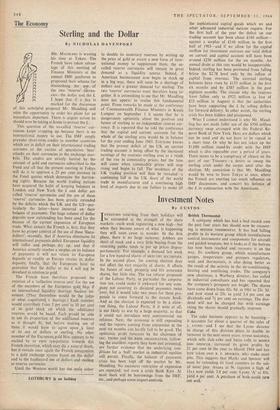The Economy
Sterling and the Dollar
By NICHOLAS DAVENPORT This question of the so-called 'reserve' cur- rencies keeps cropping up because there is no international money to use. The IMF simply provides short-term credits to member countries which are in deficit on their international trading accounts or the victims of speculative 'bear' attacks on their currencies in the exchange mar- kets. The credits are strictly limited by the amount of gold and currencies subscribed to the Fund and all that the present meeting in Tokyo will do is to approve a 25 per cent increase in the Fund quotas which determine the borrow- ing rights. Because the world trading nations have acquired the habit of keeping balances in London and New York the £ and dollar are called 'reserve' currencies and the use of these 'reserve' currencies has been greatly extended by the deficits which the UK and the US—par- ticularly the latter—have incurred on their balance of payments. The huge volume of dollar deposits now outstanding has been used for the finance of the current expansion of European trade. What annoys the French is, first, that they have no proper control of the use of these 'Euro- dollars'; secondly, that if America eliminates its international payments deficit European liquidity will suffer and perhaps dry up, and that if America actually reaches a surplus on its balance of payments it will not retain its European deposits as readily as Europe retains its dollar deposits; finally, that the Europeans have no guarantee that the dollar or the £ will not be devalued in relation to gold.
The French have therefore proposed the creation of a 'collective reserve unit' for the use of the members of the European golds bloc if an international liquidity shortage became im- minent. (They themselves would be the judge of what. constituted, a shortage.), Each member would contribute from 5 per cent to 10 per cent of its gold stock on which the additional reserves would be based. Each 6vould be able to use its proportion of the additional reserves as it thought fit, but before making use of them it would have to agree upon a limit of its use of dollars or sterling. No other member of the European, gold bloc appears to be excited by or eyen sympathetic towards this French invention, which may die a natural death, but, it reveals once again the French antagonism to a gold exchange system based on the dollar and to the haphazard use of dollars and sterling as reserve currencies.
Until the Western world has the sere either LOTIII3URY is on holiday to double its monetary reserves by writing up the price of gold or create a new form of inter- national money to supplement them, the so- called reserve currencies will remain in great demand as a liquidity source. Indeed, if American businessmen now begin to stock up in a big way, there will soon be a shortage of dollars and a greater demand for sterling. The two 'reserve' currencies must therefore hang to- gether. It is astonishing to me that Mr. Maudling does not appear to realise this fundamental point. From remarks he made at the conference of Commonwealth Finance Ministers in Kuala Lumpur on September 1 it seems that he is dangerously optimistic about the position and future of sterling as an independent reserve cur- rency. It is reported that he told the conference that the capital and current accounts for the whole of the sterling area would be in balance for the year ending June 1965. Everyone knows that the present deficit of the UK on current trading account is being offset by the increased earnings of the overseas sterling area as a result of the rise in commodity prices, but the time will come when commodity prices will- stop rising and begin to fall. The weakness of the UK trading position will then be revealed—a continuing fall in the UK share of the world trade in manufactures and a continuing high level of imports due to our failure to make all
the sophisticated capital goods which we and other advanced industrial nations require. For the first half of the year the deficit on our trading account has been about £160 million— against a surplus of £146 million in the first half a I963—and if we allow for the capital outflow for investment overseas our total deficit on current and capital account will have been around, £250 million for the six months. An annual drain at this rate would be insupportable. Indeed, sterling has been prevented from falling below the $2.78 level only by the inflow of capital from overseas. The external sterling balances have risen by £135 million in the first six months and by £385 million in the past eighteen months. The reason why the reserves have fallen only to £923 million (a loss of £33 million in August) is that the authorities have been supporting the £ by selling dollars for forward delivery. In other words, the sterling crisis has been hidden and postponed.
What I cannot understand is why Mr. Maud- ling has not made fuller use of the $500 million currency swap arranged with the Federal Re- serve Bank of New York. Here are dollars which can be used and do not have to be repaid in a short time. Or why he has not taken up the $1,000 million 'stand-by credit with the IMF which is also repayable over a period of years. There seems to be a conspiracy of silence on the part of our Treasury—a desire to sweep the sterling crisis under the carpet until after the election. My conviction is that Mr. Maudling would be wise to leave Tokyo at once, where the French are exerting too much influence on IMF discussions, and concert his tlefence of the £ in conjunction with the Americans.






























 Previous page
Previous page